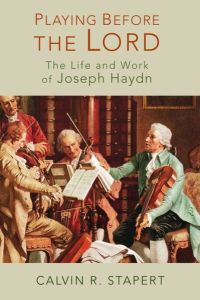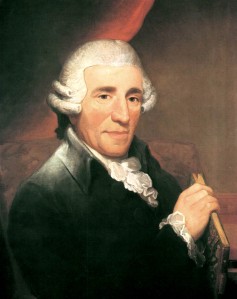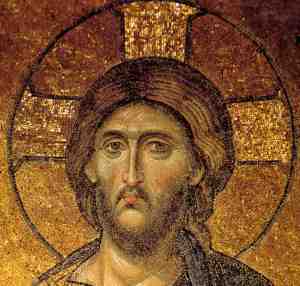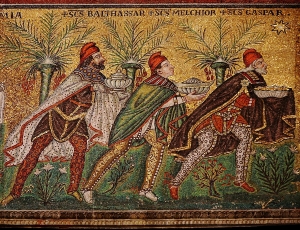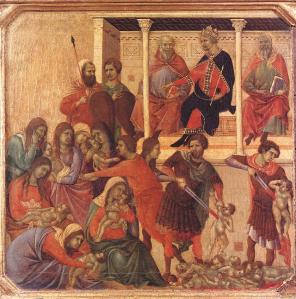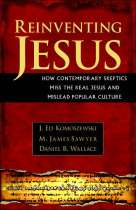Music for Christmastide (12 Days of Music, Part 1 – Days 1 and 2)
As one who often speaks about reclaiming and restoring the Classic Christian heritage of the West, the subject of Christian Holy days and seasons often comes up. One of the ways the church and its people have expressed the joy of seasons such as Christmas and Easter is of course through music. Not just any music, or the pabulum you hear at the department store or on the “Adult contemporary” station, but actual art music that attempts (and I would argue, sometimes succeeds) at reaching the transcendent. With this in mind, I am compiling a sort of “playlist” for the 12 days of Christmastide, and if you observed Advent (like many Western Christians do), you should not be “burned out” like much of the rest of the world. So here is part 1 of my “Music for Christmastide” series.
Through all 12 Days: Bach’s Christmas Oratorio. There are several reasons for this. One, Bach is the master when it comes to music with a message (rarely if ever equaled), the piece is deep and stands up to many hearings (unlike most Christmas music), and the work itself is a compilation of 6 different sections gathered together. Part 1 is for Christmas Day, Part 2 is for the Shepherds (Dec. 26th), Part 3 is for the adoration of the Shepherds (Dec. 27th), Part 4 is for New Year’s Day (Jesus’ circumcision and name day), Part 5 is for the Journey of the Magi (First Sunday in January), and Part 6 is for Epiphany, the visit of the wise men, and the end of Christmastide. So in other words, this is a piece that you can “live with” for the entire Christmastide season. Amazingly, there is an excellent video on YouTube with period instruments and English subtitles in which the applause breaks up the 6 sections. I highly commend it:
Day 1 (Dec. 25th):Handel’s Messiah, Part I. Even though this piece is ubiquitous during Advent and Christmastide, it really is a great piece of music, especially when your sole experience of it is not “sing alongs”. Handel was master melodist and so effective that Mozart famously said “when he chooses, he strikes like a thunderbolt!” Handel was also Beethoven’s favorite composer, and Haydn was so moved by Messiah that it was an inspiration for his late great oratorios (The Creation and The Seasons). Part I gets you into the Biblical text in English, and demonstrates musically how the Old Testament is about Christ. This is perfect for the contemplation of the text. My favorite recording is with McCreesh and the Gabrieli Consort, but this video is infectiously energetic:
Day 2 (Dec. 26th): Italian Christmas Concertos. In the Roman church during the 17th and 18th centuries, it became common practice for famous composers of the time to write “Christmas concertos,” so-named because the concluding movement was often a “pastorale” which evoked the peace and serenity of the Holy Nativity, and the performances were often given during Christmastide. Corelli’s is probably the most famous, but Manfredini, Vivaldi, Torelli, and many others contributed to this genre. There several collections of these on the market like this one, and the YouTube playlist below should provide a good taste.
Day’s 3 and 4 soon to come…
A “Selfie” Abortion, and What That Says….
 In a culture of Facebook self-worship, in which increasingly isolated individuals who crave community share everything about themselves, we have passed a new “milestone,” that of the “selfie” abortion video. Meet Emily Letts (Caution: While not overly graphic, the YouTube video is troubling), an abortion counselor who decided to film her abortion “experience” to demonstrate in her words, “that there is such a thing as a positive abortion story,” so that, “I can share my story and inspire other women to stop the guilt.” Throughout the video and the interview in the notoriously sordid check-out aisle magazine Cosmopolitan, Letts seems most obsessed in particular with this guilt aspect, since as one who works in a clinic, she sees guilt on a daily basis. She makes statements such as “I know there are women who feel great remorse. I have seen the tears. Grieving is an important part of a woman’s process,” and “Even women who come to the clinic completely solid in their decision to have an abortion say they feel guilty for not feeling guilty.” This is okay for her because she “(doesn’t) feel like a bad person. I don’t feel sad. I feel in awe of the fact that I can make a baby. I can make a life. I knew that what I was going to do was right, ’cause it was right for me and no one else. I just want to share my story.”
In a culture of Facebook self-worship, in which increasingly isolated individuals who crave community share everything about themselves, we have passed a new “milestone,” that of the “selfie” abortion video. Meet Emily Letts (Caution: While not overly graphic, the YouTube video is troubling), an abortion counselor who decided to film her abortion “experience” to demonstrate in her words, “that there is such a thing as a positive abortion story,” so that, “I can share my story and inspire other women to stop the guilt.” Throughout the video and the interview in the notoriously sordid check-out aisle magazine Cosmopolitan, Letts seems most obsessed in particular with this guilt aspect, since as one who works in a clinic, she sees guilt on a daily basis. She makes statements such as “I know there are women who feel great remorse. I have seen the tears. Grieving is an important part of a woman’s process,” and “Even women who come to the clinic completely solid in their decision to have an abortion say they feel guilty for not feeling guilty.” This is okay for her because she “(doesn’t) feel like a bad person. I don’t feel sad. I feel in awe of the fact that I can make a baby. I can make a life. I knew that what I was going to do was right, ’cause it was right for me and no one else. I just want to share my story.”
In the words of Reformed Baptist Al Mohler, “Emily giveth, and Emily taketh away.” While reactions to the video and interview have been overwhelmingly negative, should we honestly be shocked that this has happened? In a culture in which we are told that we are all autonomous individuals who make our own decisions, including deciding morality and truth for ourselves, why this hasn’t happened sooner is the real question. (For good commentary on this incident, see this piece by Al Mohler, and this post by Ben Domenech. For a great compassionate call to Ms. Letts, see “My Abortion Story: An Open Letter to Emily Letts” by Garrett Kell.)
 What sort of culture gives birth to this sort of thinking and “experiences” while denying the births of other human beings? The answer is the lie of the autonomous self. The ability to choose one’s own reality, one’s own truth, and one’s own morality is sacred. This allows us to have an increasingly large laundry list of “rights” in which, “as long as I don’t hurt anyone,” or “as long as there is consent,” I can do whatever I want. I can personally oppose something as long as I keep it private, but any sort of attempt to assert a universal truth or moral is automatically “imposing your beliefs on others,” i.e., a violation of my rights to do and feel whatever I want. It damgages my “self-esteem” and my “self-worth.” And if you dare oppose this, you are of course “judgmental,” or “oppressive,” or (gasp) an orthodox Christian! In fact, many would actually define freedom as something like “The ability to decide whatever I want for myself in order to feel self-fulfilled.” A better working definition of freedom would perhaps be, “the ability to know and pursue the good,” but this would assume we know what good is, and that it is worth pursuing. Augustine was absolutely correct when he said that the natural tendency of man without God is to “curve inward on oneself.”
What sort of culture gives birth to this sort of thinking and “experiences” while denying the births of other human beings? The answer is the lie of the autonomous self. The ability to choose one’s own reality, one’s own truth, and one’s own morality is sacred. This allows us to have an increasingly large laundry list of “rights” in which, “as long as I don’t hurt anyone,” or “as long as there is consent,” I can do whatever I want. I can personally oppose something as long as I keep it private, but any sort of attempt to assert a universal truth or moral is automatically “imposing your beliefs on others,” i.e., a violation of my rights to do and feel whatever I want. It damgages my “self-esteem” and my “self-worth.” And if you dare oppose this, you are of course “judgmental,” or “oppressive,” or (gasp) an orthodox Christian! In fact, many would actually define freedom as something like “The ability to decide whatever I want for myself in order to feel self-fulfilled.” A better working definition of freedom would perhaps be, “the ability to know and pursue the good,” but this would assume we know what good is, and that it is worth pursuing. Augustine was absolutely correct when he said that the natural tendency of man without God is to “curve inward on oneself.”
Yet human beings are NOT by nature autonomous individuals. We crave a sense of community and belonging. Before the rise of the utopian democratic egalitarian state, most found this sense of community in the family, the local community, the local church, and perhaps other common cultural phenomenon (such as music, language, literature, feast days, etc…). However, the combination of the autonomous self and the utopian secular democratic state of have made community virtually impossible to find, unless you can agree with the mob and join the latest sacred cause, and even then, the “community” found here is little better than an organized mob. I believe that Emily Letts, deep down, not only craves community and a sense of belonging, hence the video “selife,” but also knows that there is something spiritually amiss. There are real things such as guilt, and shame, and conversely, honor and truth. Denial for the sake of self-congratulations will not change this, and posting videos and lobbying the government for “rights,” will not change this. Only a knowledge of God’s perfect law and God’s sweet gospel can accomplish such a miracle. So pray for people like Emily, and pray for our culture that sacrifices people for the sake of the freedom of the self.
How to Not Write About Biblical Morality
This is a running commentary/stream-of-consciousness response to a rather bizarre attack on the Christian worldview, and especially the Old Testament found in the Holy Scriptures. The original column can be found here, although the entirety is posted here with commentary in italics. It seems the real reason for the column is a rather volatile local political issue here in Southeast Idaho, but the majority of the column is mostly an attack on the Scriptures and Christianity. A more formal columned response is to follow…
Biblical Morality (Idaho State Journal, 3-30-14)
Found at: http://www.pocatelloshops.com/new_blogs/politics/?p=11925
By Jack Moore
(Running Commentary by Aaron Hayes in Italics)
“I keep seeing quotes in the letters to the editor about objective morality. I still wonder what the writers mean by it.”
Most in the classic Christian tradition mean something akin to “those actions, thoughts, and behaviors which reflect the character, will, and mind of the one God.” This God is Holy, Righteous, judge, all-knowing, all-powerful, all-present, all-good, just, perfect, simple, love, merciful, etc…and has revealed himself especially in the Holy Scriptures, and also through his church and natural law. This is objective morality, based on God’s transcendent and imminent reality.
“I have come across few objective moral truths. One is: “Treat others with love and kindness.” Jesus said it this way: “Love your neighbor as yourself” (Matthew 22:27-29). I fail at this one small morality often.”
These certainly qualify as objective moral truths, although they are certainly not the only ones. And yes, we all DO fail to meet these standards, which is why we need Jesus to save us in the first place. This being said, moral truths and laws only make sense in the Christian worldview. Any other worldview cannot account for the laws of logic and morality, because such laws are based on the character of the lawgiver and His sustaining of creation. If we are here by accident/chance, or if laws are based on culture or the individual, they are completely arbitrary and non-objective. Only the Christian faith can make a coherent and sensical worldview out of the very idea of law and morality.
“Besides that one, I have not found any objective moral truths in the Bible.”
You must not be looking very hard. Ever heard of the Ten Commandments? Ever encounter the phrase, “Thus says the LORD?” That’s pretty absolute and objective!
“If there are some they are well hidden.”
Only for those who refuse to seriously and objectively look. Any basic orthodox Christian systematic text will suffice, or even a good study bible. Talk to any Christian who has been catechized (instructed) and you will get some objective morals and truths right away.
“That is why I cannot understand why people hold the LGBTQ community in such disregard.”
If you cannot see why Christians teach what they teach, then yes, it is probably difficult to understand why the church teaches what it does regarding human sexuality. This is however out of love of God and neighbor, not so-called ‘disregard.’
“Out of all the laws in the Old Testament, the passage in Leviticus concerning homosexuality is the one law that must be upheld (Leviticus 18:22). It is always quoted to justify discrimination against the LBGTQ community.”
This is a woeful misunderstanding on a variety of different levels. First, Christians teach the entire counsel of God, not just a single law. All of God’s laws are upheld, God’s law is perfect, and Christ himself says that not one “jot or tittle” will pass away, and that He came to fulfill the law (Matthew 5:16-20, and that word fulfill is VERY important for understanding this issue). It is the law which makes us realize how desperately we need a savior. So no, Christians don’t just uphold one law, but rather know how broken we are when confronted with the whole of God’s law. The question here is how God’s objective truths apply in civil society in a flawed and broken world, and how these are enforced. Besides, do you know any Christians going around saying it okay to lie, to cheat, to steal, and to commit adultery? Those are laws that Christians uphold….so obviously there isn’t just one. And the word “discrimination” assumes certain things that the Christian worldview is not willing to grant, such as sexual behavior being how one defines an individual as a class for example.
“I wish someone could explain to me why society has done away with 99 percent of Mosaic and Levitical law, but has decided to keep this one part of it.”
Where does this percentage come from? 1 out of 100? I hope this is simply rhetorical, and if it is, it is overstated to the extreme. For the record, there are 613 different laws. And no, Christians do not just “keep this one part of it” as explained above. Secondly, the Holy Scriptures contain multiple instances in which God’s design for marriage, family, and sex is demonstrated. Leviticus 18:22 is not the only passage in Holy Scripture that references homosexual behavior. There is another passage in Leviticus 20:13, Paul’s use of “natural” and “unnatural” in Romans 1:18-27; I Corinthians 6 includes such behavior alongside a variety of other sins/vices; I Timothy 1:9-11; and Jude 1:7, which describes the sin of Sodom found in Genesis 19:1-5 as going after “strange flesh,” which demonstrates what the Genesis passage is about. The passages found in I Corinthians and I Timothy use a Greek compound word from the Greek translation the Leviticus passages (arsenoskoitan). In other words, the morality found there still applies “across the testaments” for all people and all time, not just ancient Judaism. Such behavior is also excluded by the created order found in Genesis 1-2, Jesus’ definition of marriage as one man-one woman found in Matthew 19:4-6 (referring back to the created order), and the general prohibition against sexual immorality found throughout Scripture (such as the word porneia, which would include ALL forms of sexual immorality outside of one woman-one man marriage). We also know that God does not lie (Numbers 23:19), does not change (Malachi 3:6, Hebrews 13:8), and is not the author of confusion (I Corinthians 14:33). All of this demonstrates that far from being “hidden” or “unclear,” the Holy Scriptures are remarkably consistent and clear on this issue. Natural law also bears this out, given the physiological, emotional, and reproductive complementarity between the sexes. Even if one were to remove the Leviticus passages, the position of the universal church would be the same, as it has been since the beginning.
““Thou shalt not kill” (Exodus 20:13) is not even an absolute for most Christians. If it was, the death penalty would not exist, we would not send soldiers into war, and there would be no such thing as an armed drone.”
This is simply a misreading of the KVJ translation. Most modern translations use the term “murder,” and the Hebrew here covers both intentional and negligent killing (what we could call manslaughter and deliberate homicide), not capital punishment or just wars.
“God could not even give us the correct laws about eating. I find this to be very telling. If eating pigs and shellfish is OK now, and God got this wrong then, how can we trust God’s moral judgment on who people should love? (Leviticus 11:7-10).”
God gave perfect laws then, and he gives perfect laws now. There is no contradiction. Why? The ritual and cultic laws of Israel which were to teach them about God’s holiness and how they were to be different to the nations, has been fulfilled/superseded (NOT abolished or contradicted) by Christ. All of God’s creation was originally very good (Genesis 1), and God tells the Apostle Peter that nothing the Lord has made is unclean (Acts 10). Instead of a nation/state theocracy as God’s people (ancient Israel), God has called his people from every nation, tribe, and tongue on the earth, due to the work of Christ. Because of this, the ritual and cultic aspects of ancient Israel are no longer necessary, although it is certainly within the realm of freedom to observe such things if one so chooses. These ritual/cultic laws such as the food laws (some of which may have had sanitation concerns as well), the weaving of fabrics, building fences on roofs etc…still tell us about the character of God, and contain absolute truths behind them. Other laws such as the dimensions of the tabernacle, the priestly garments etc…are fulfilled in the person of Christ. The greater is here (Jesus). This does NOT mean that the universal laws found throughout scripture, such as the teachings on human sexuality, lying, stealing, etc…are abolished. They are still in force and have been since the beginning. To claim that the universal laws and the food laws are the same sort of thing is to commit a category error, or a fallacy of composition.
“How moral is the Bible, anyway? I find the law that says a woman has to marry her rapist or be stoned to death a pretty abhorrent law and very revealing—the rapist has to pay for his plunder (Deuteronomy 22:28-29).”
This is actually an amazingly benevolent action. In the ancient near east, a woman who was violated was as good as dead, an outcast, and most likely would turn to prostitution to survive. Instead of these things, God’s people were quite “liberal” in the good sense of the word, by stating that the woman had rights, and must be taken care of (shelter, food etc…) by the perpetrator of the crime. Compared to other near eastern law codes, this is simply amazing, and demonstrates God’s concerns for both man and woman. Notice that the man cannot divorce her as long as he lives, and the rest of the law in how he treats her would still apply.
“This, by the way, is one form of “traditional marriage.” That kind of “morality” has no place in a civilized society. I don’t know anyone personally that would defend it. That is because it is not moral.”
No, this is not a “traditional marriage,” it is an example of case law. Case law is what you are to do should a certain situation arise. Prescriptive law is a command. The rape example given here is an example of case law, not something that is ideal or normal. And while some certainly use the term “traditional marriage,” it really is just “marriage,” which exists independent of whatever a given society might try to make of it, and anything else is simply a counterfeit. Regardless, this is again another category error, in which case law is confused with prescriptive law. Notice also that how marriage is defined is assumed here, even if the circumstances leading up to it were sinful and requiring justice.
“Conservatives hold onto “Homosexuality is a Sin” for two reasons. Otherness. It is a foreign thing to them. It is a way of thinking that they do not understand, and so it should be punished, because heterosexuality, their way, is what they know. The other reason is control. Sex should be controlled, especially regarding women.”
Translation: Because I do not understand how people could possibly disagree with me, I have to explain this opposition away by saying there is a psychological deficiency in my opponent. There is an inherent arrogance and insulting tone about this, because it implies that the author is “enlightened,” but orthodox Christians fearful power-grabbers. However, Christians know all too well the power of sin, death, and the forces of evil, which is why we say what we say! It isn’t because of “otherness” or foreignness, but because without the grace of God, we are all lost. Teaching God’s design for humanity is an act of love, and a duty for every Christian, not a power-conspiracy or unfounded fear.
“Morality comes from society as a whole. Morality grows and develops as the knowledge of society grows. We know that homosexuality is not a choice and even if it was, it should not be punished by society. There is no morality in consensual sex. It is merely part of nature.”
Saying that there is no morality in consensual sex is a nonsensical statement. To use a term like “consensual” implies a certain morality about individuals and choice. The very statement includes a moral judgment, yet somehow there is no morality in it? This statement is self-refuting. Also, why stop at “consensual sex” if the justification is a “mere part of nature?” We see a variety of other actions in the animal world, and if humans are simply part of nature and nothing more, why arbitrarily stop at “consensual sex?”
If morality comes from society, then there is no such thing as objective morality, since as the author admits, it grows and develops. This implies change. If morals change, they are inherently non-objective, and subject to the whims of the majority or culture. If this is how one views morality, then having difficulty seeing objective morality isn’t exactly a surprise, and should be expected. Morals are based on truths about who we are, our place in the universe, how we relate to each other, and the like…If this is changeable or society-contingent, we might as well give up now, since morality will collapse into despotism (people are made to agree) or anarchy (each individual decides for himself) or some combination of the two. Either way, morality as a useful term has disappeared, and we should stop using it. Perhaps we should start talking about utility instead….
“I believe there are objective moralities.”
Which makes no sense in a naturalistic/materialistic worldview.
“A couple that most people agree on are slavery and genocide are evil, both of which the Old Testament encourages (Leviticus 25:44-46 and Deuteronomy 13:13-19).”
This is quite telling, the statement “most people agree on.” A democratic or majority consensus does not decide truth, truth is truth regardless of the number of people who believe in it. To say “I believe there are objective moralities” and then appeal to “what most people agree on” undermines the case (if there is one) being made. To use a term like “genocide” and apply it to Scripture is another case of a category error. Taking a modern concept (the systematic eradication of an ethnic group) and comparing it to Israel’s conquest of Canaan because of pagan immorality and evil is not even close to the same thing. God does not command Israel at any point, “kill them all because they are Canaanites,” but rather because these people were so morally corrupt their culture was being judged. In fact, God’s people pass by at times because some cities’ “iniquity was not yet full,” meaning they hadn’t corrupted themselves yet (Genesis 15:16). It is also quite telling that God would use the other nations to punish his own people, hardly the act of someone engaged in “ethnic cleansing” or genocide. In regards to slavery, a better modern equivalent would be “indentured servant,” not the slavery of the antebellum south, which most moderns have in mind. The idea of case law and prescriptive law also comes into view again here.
“Another couple of evils that God perpetrates are child ritual sacrifice and infanticide (Exodus 12:12 and Judges 11:29-40). Most people agree that these things are evil, but they completely gloss over it when the evildoer is their God.”
Other than the faulty “most people agree” basis for determining morality rearing its head again, both of these passages have rather straightforward explanations. The case of Jephtha’s daughter (Judges 11) is not perpetuated by God (it is because of a rash vow by a man in a troubled culture in a troubled time), and both Christian and Jewish scholars have demonstrated that the text is far from clear in terms of the daughter’s fate, and the church fathers such as Chrysostom and Ambrose say that God is permitting an evil (notice permitting an evil is not the same as endorsing it!) for teaching purposes. Either way, God doesn’t do this, does not endorse it, and to claim he does means one has completely misread (or not even read) the text. The killing of the firstborn in Exodus 12:12 is the 10th plague, in which Pharaoh (a ‘god’ in Egyptian culture and law) was given every opportunity to stop his evil actions, and brings death and destruction down upon himself and his people. Remember here that there is no such thing as “separation of church and state” or even “individual rights” in many senses, so cooperate guilt was a very real thing. Secondly, it is also likely that Egyptian law contained within it the idea of “reciprocity,” and since Pharaoh was actively killing Hebrew children without discrimination (true infanticide) over the course of decades, God acting in a limited sense (only males of a certain age) in a limited amount of time, was perfectly just based on the practices of Egypt. If anything, it demonstrates God’s restraint (“I take no pleasure in the death of a sinner” Ezekiel 18:23).
And again, to somehow argue that this means God endorses this as normal or ideal is to completely misread the entire counsel of God, and assumes that one can judge God. This is key, as the entire piece seems to assume that a created being with finite understanding who has to rely on what the majority has agreed on for any sense of morality, and presumes to judge the perfect creator for His acts of justice. This would be laughable if it wasn’t so serious.
“The most dangerous idea in the Bible is the idea that there are “the chosen.” Apparently these chosen can do all kinds of evil, but because they are “chosen,” their evil is good or acceptable. It is the antithesis of “No one is above the law.” The idea of the chosen never made any logical sense to me. Yet people espousing their faith speak of an objective morality found in the Bible.”
I’m not sure how this can even be taken seriously. Surely the author is aware of the multiple times God judges His own people for their evil? The Babylonian captivity and exile anyone? The Persians? Philistines? Etc….So no, in God’s eyes, being part of God’s people does not exclude you from judgment. God also “chastises those he loves,” (Hebrews 12:6) which isn’t exactly an endorsement of evil for being on the right team. To claim that being part of God’s redeemed people is permission to violate God’s laws is to completely misunderstand the nature of the gospel. Christ saves us in spite of our violations, in spite of our selfishness, in spite of our rebellion, in spite of our evil. He saves us from ourselves. If you would like to know the consequences of our evil, look at a crucifix. Again, we have terms like “evil” being tossed around as if we should know what that term means. Since the author is rejecting the source of all creation, the very definition of good and love, how does a term like evil have any meaning except that which society decides it does? Why should I take the author’s word for it, since he is admitting that his “objective morality” is based on society’s whims. The term “evil” only makes sense in reference to what “good” is, meaning it is a parasite, a negation of the eternally blessed source of goodness. Also, orthodox Christians long and want ALL of humanity to come to faith, even though we know many will not. We want you to be part of the “chosen,” including the author of this hit piece. We are trying to reach the lost, as much as we fail to do so. “God is not willing that any should perish, but that all should come to repentance.”(II Peter 3:9). How exactly does this excuse evil? We are told to repent, not just do what we want…
“Dr. Archie B. Carroll says “As religion and faith are being driven out of the public square, the Judeo-Christian ethical foundations that have sustained our country since its beginning are being replaced with a humanistic amorality, a self-centered, pragmatic indifference that will ensure that our moral compass will fail to point us in the right direction in the future.” Is Dr Carroll saying that this country is going to be morally corrupt because it is losing its ties to biblical morality? I say just the opposite. I say that women’s and civil rights have done a great deal to undo the moral corruption that the Bible brought to this great country.”
“Woe to those who call evil good, and good evil.” (Isaiah 5:20). And any historian worth his salt will gladly stack up Christianity against competing worldviews in history regarding the status of women, slavery, etc…see the work of Dr. Alvin Schmidt or Dr. Rodney Stark for more on this. Of course, without the Christian tradition, there wouldn’t be “this country” in the first place.
“Where exactly does this moral compass that Dr Carroll speaks of point? If it points in the direction of the Sermon on the Mount, then I can go along with it. I don’t think that is what he had in mind though. The direction he is pointing is not where I want to go.”
In other words, I want to pick and choose what is convenient for me, or whatever society thinks is useful or popular, not what God actually says. I am the god of my own universe, so I pick what I want, and throw out the stuff that I don’t like. You can’t speak of morality in a coherent way while denying the source. You can still live morally, but the worldview is incoherent.
“My moral compass points to this. Our laws should reflect our awareness that everyone has worth. If our society is rich enough, no one should go hungry, go without a roof over their head, lack proper medical care, or live without proper sanitation.”
Why should your compass matter? Why does everyone have worth? Why should hunger, shelter, medical care, sanitation etc…matter when society decides what morality is? What if society decides that the elderly are too much of a burden and lack a high quality of life and should be eliminated? Since the source of morality here is completely arbitrary, it can arbitrarily rejected.
“There are a lot of people that believe these basic rights are things that should be earned. I hope they, themselves, never have to suffer the indignity of what they propose.”
Where do these rights come from, and why should they matter? What exactly is a ‘right’?” and why should I care if we are just materialistic products of nature, about someone else’s rights? After all, what they are and what they are there for will simply develop as society develops.
“With all this in mind, then, how can someone argue from a moral standpoint that homosexuality is evil? They cannot.”
Sure they can, because they actually read the text seriously from “cover to cover” and not by copying and pasting from Richard Dawkins style diatribes. They actually look at textual context, the church in history, natural law etc…something that this author has not even bothered to do in the slightest.
“The Bible is not a book that you can argue a moral code from—at least not one that does not contradict itself. The LGBTQ community is about as evil as a woman eating a piece of fruit. Yes, quite benign.”
Of course, this world is a paradise, or soon will be…that’s news to…everyone? But denying original sin isn’t exactly a surprise here.
“LGBTQ individuals should be treated with the same respect and dignity that you treat your church-going neighbors.”
No one is arguing that those with these predilections should be treated as less than human. What is being questioned is whether or not such behavior should be endorsed, and whether people of conscience and who own private property should be forced to endorse or become a material party to behavior they deem morally wrong. Of course this assumes that we should start defining people by inclinations and behavior (people are just animals) rather than their worth as people created in the image of God.
“That is why you should vote NO on May 20 to keep Pocatello’s ordinance in place. It is the moral thing to do.”
No comment.
The main problems with this column/hit piece on Christians can be summarized as follows:
1. The author simply has not done his homework in dealing with the biblical text, but seems content to take cheap potshots without consulting any source that might have answers to some of these “difficulties.” The relationship between the law and gospel has been discussed and written about since the time of the New Testament, so I’m not exactly sure why the author seems ignorant as to the variety of different solutions that have been offered throughout time, space, and culture, many of which are the same (reflecting, *gasp, objective biblical morality).
2. The author presumes to make moral arguments as an authority, but gives no reason why we should trust him as an authority, other than the vague and completely arbitrary, “most of society says…”
3. Only the Christian worldview can account for universal laws of morality, laws of logic etc…To make an argument for some sort of objective reality whilst denying the source of what makes such thinking even possible is inherently irrational.
4. The opposition to the sort of behaviors the author references is not limited to Christians, but also includes orthodox Jews, Muslims, and proponents of natural law (including some atheists). Taking uninformed cheap shots at the Bible in order to demonstrate one’s superiority isn’t a new tactic, but it is completely unhelpful and has no place in the “civilization” he seems so concerned about.
The Text is Right (Response 2)
The following is part 2 of a response to a local newspaper blog. Part 1 can be found HERE.
The original article that prompted the response can be found HERE.
In the digital column, “The Christmas Story and Other Redeeming Myths” (ISJ, December, 2013), several historical and textual objections to the Christmas narrative were raised. While the “comparative religion” parts of this column have already been addressed, the historical and textual issues remain.
First, in regards to the wise men (Magi) seeing a star “in the east,” (Matthew 2:2) many scholars and translators have translated this phrase “at its rising,” with the phrase “in the east” a reference to astronomy, not geography. In other words, the Magi had seen the star when it first appeared. In Matthew 2:1 the Greek word “anatolai” in the plural form usually refers to the rising of the sun, and can indeed refer to the direction of the east. However, in Matthew 2:2 (and 2:9), the word is singular, and usually refers to the rising of a star. No, the magi were not directionally challenged! It is also important to remember that the Magi were looking for the King of the Jews, and that the star is actually moving before them to Bethlehem, after which they actually worship the Christ-child, the Second Person of the Trinity in the flesh. The Magi knew who they were looking for and where to go to find Him.
Considering the “Slaughter of the Innocents,” (Matthew 2:16-18), it is not really that odd that the historian Josephus doesn’t mention this. Given that the total amount of children that fit the bill in 1st century Bethlehem (males under two) is likely a couple dozen at most (although certainly enough), it is not a surprise that Josephus would not report something that was “trivial” by Herod’s standards. The silence of Josephus says nothing about the truth or falsity of the event. Given the general historical reliability of the gospels, and what is known about Herod, the Slaughter of the Innocents is perfectly feasible, and one could even say likely. Of course the gospel authors DO count as historical sources, something often forgotten.
Next, the Apostle John’s gospel, while not mentioning the virgin birth in explicit terms like the narratives of Luke and Matthew, DOES contain one of the highest statements about the person of Christ in all of Holy Scripture, in which Christ is considered fully God as the Word that created all things taking on flesh (John 1:1-4, 14). In other words, He is not of human (or pagan ‘gods’) origin. That Nathanael seems to be ignorant of the Virgin Birth, or Christ in general in John 1:46, is hardly surprising since he hasn’t met Christ yet! The whole point of the surrounding passage is to demonstrate that Christ’s divine knowledge causes Nathanael to become a disciple and worship Him. How this impacts the infancy narratives in Matthew and Luke is hard to determine.
It is rather strange to claim silence about the Virgin Birth in John’s gospel, in which Christ is so clearly presented as God (including famous I AM statements, which no Jew would have missed), somehow means we should doubt the Virgin Birth. The passages usually brought to bear on this, such as the crowd disagreeing about Jesus’ origin in 7:40-52, only indicate that the crowd was disagreeing. The passage demonstrates the uproar that Jesus’ ministry was creating, and to say “no one answered the crowd” as if that means John or the other disciples were ignorant of the Virgin Birth is reading far too much into the text. John is reporting the events, not answering every critic walking around Judea.
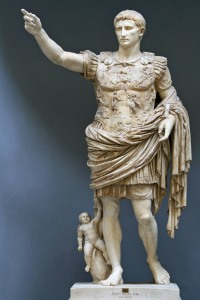 Finally, the historical veracity of the census reported by Luke is disputed. That Caesar Augustus was famous for his census taking is not really disputed among scholars. What seems to be questioned is whether or not a census took place in 4-6 B.C in the area of Palestine. Let’s look at one possible answer to this, bearing in mind that there are more which are perfectly compatible with Luke’s gospel. One important fact to consider is how long some of these censuses took to complete. It took around 40 years for the Romans to complete a census of Gaul, a province relatively next door. Josephus mentions a census in A.D. 6. If it took the Romans 40 years to complete one nearby province, finishing up around 10 years after the initial call in a province 1500 miles away is understandable. So, one solution is that Josephus is reporting the end of the census that started around the birth of Christ. And contrary to some skeptical thinking, we DO have records of censuses requiring people to go back to their homelands, including a 1st century census in Egypt, and also records that women and children were also registered (See historian Dr. Paul Maier’s book, “In the Fullness of Time” for more on this evidence). Luke’s census is perfectly legitimate.
Finally, the historical veracity of the census reported by Luke is disputed. That Caesar Augustus was famous for his census taking is not really disputed among scholars. What seems to be questioned is whether or not a census took place in 4-6 B.C in the area of Palestine. Let’s look at one possible answer to this, bearing in mind that there are more which are perfectly compatible with Luke’s gospel. One important fact to consider is how long some of these censuses took to complete. It took around 40 years for the Romans to complete a census of Gaul, a province relatively next door. Josephus mentions a census in A.D. 6. If it took the Romans 40 years to complete one nearby province, finishing up around 10 years after the initial call in a province 1500 miles away is understandable. So, one solution is that Josephus is reporting the end of the census that started around the birth of Christ. And contrary to some skeptical thinking, we DO have records of censuses requiring people to go back to their homelands, including a 1st century census in Egypt, and also records that women and children were also registered (See historian Dr. Paul Maier’s book, “In the Fullness of Time” for more on this evidence). Luke’s census is perfectly legitimate.
As much as we moderns/post-moderns would like the gospel writers to arrange their material in a scientific and systematic manner and answer every minute objection with footnotes, the gospels thankfully resist such piecemeal attacks on Christ’s integrity, and refuse to bow to those who self-congratulate themselves as “enlightened.” Whether it is obsessing over the tiniest of details or blurring the difference Christianity has over other religions, missing the salvation offered by the God-man, Jesus Christ, is the most tragic mistake of all.
For Further Reading:
In the Fullness of Time: A Historian Looks at Christmas, Easter, and the Early Church
Extended Discussion on the Issues involving the Census found in Luke
No Parallel (Response 1)
The following is part 1 of a response to a local newspaper blog which published this:
The Christmas Story and Other Redeeming Myths
In the digital column, “The Christmas Story and Other Redeeming Myths” (ISJ, December, 2013), the historical nature of the Nativity of Jesus Christ was severely questioned and minimized. There are two angles of thought in this, one involving supposed historical and textual problems, and the other with the alleged “non-uniqueness” of orthodox Christianity, in which every possible parallel is made between Christianity and other religions. This is done in order to construct a sort of pan-humanistic myth that is a teaching tool only, and certainly not real history. Let’s first look generally at the idea of this “Parallelomania” with the textual/historical issues being addressed at a later date.
The idea of “comparative religions” to try and eliminate the unique features of any religion to make them all similar is described best by 20th century liberal historian Adolf Von Harnack: “We must reject the comparative mythology which finds a casual connection between everything and everything else… By such methods one can turn Christ into a sun god in the twinkling of an eye, or one can bring up the legends attending the birth of every conceivable god, or one can catch all sorts of mythological doves to keep company with the baptismal dove…the wand of “comparative religions” triumphantly eliminates every spontaneous trait in any religion” (Quoted in Reinventing Jesus, 227, by Komoszewski, Sawyer, and Wallace). Only by the loosest possible scenarios can such comparative “wand waving” even be feasible, and when the Triune God of classic Christianity is examined closely, there is simply nothing like orthodox Christianity.
No other faith in the world has the creator God of the universe, not “supermen” like Zeus, or Krishna, or Saoshaynt, or Buddha, or Mithras, or Zoroaster etc…But the God of which “that which nothing greater can be conceived,” actually taking on human flesh for the redemption of His creation because of our fallen condition. There is simply nothing like it. Any other “miraculous births,” “resurrections,” “communion meals” etc…that are supposedly held in common with the salvation history of Christianity, are modernist constructs that commit several historical fallacies. These fallacies include the “terminological fallacy” (taking Christian terms and concepts and reading them into other religions), the “dependency fallacy” (parallels do not inherently mean borrowing, and form and substance are different things), the “chronological fallacy,” (many of the religions that bear these features were reacting to the spread of Christianity, not the other way around), and the “composite fallacy” (lumping pagan religions together into a sort of narrative par excellence that never existed). Since we are in the season of Christmastide, speculation around the Virgin Birth is a good example of these fallacies in action.
Most of the candidates for “virgin birth” similarities are either pagan gods such as Perseus or Dionysus, historical/legend figures like Romulus, or actual historical figures of great importance such as Alexander the Great. In EVERY case, some sort of actual physical coupling takes place between a god (who is never the supreme ruler of the universe like the Christian God) and a usually mortal woman, with the physical union resulting in a pregnancy. For example, in the case of Perseus, Zeus takes form as a “shower of gold” and physically impregnates Danae. In the case of Heracles, Zeus takes the form of Alcmene’s husband and forms a union with her. When it comes to Romulus, one of the vestal virgins is “ravished,” and Mars is the implied father. Even the “divine” birth of Buddha occurs from one who is already married and has enjoyed “loves delights” with her husband beforehand, hardly comparable to the Virgin Mary. And of course, Buddha is not the creator of the universe taking on flesh.
20th century New Testament scholar Raymond Brown demonstrates the fallaciousness in such an approach when he writes, “Non-Jewish parallels have been found in the figures of world religions (the births of Buddha, Krishna, and the son of Zoroaster), in Greco-Roman mythology, in the births of the pharaohs (with the God Amun-Ra acting through the father) and in the marvelous births of emperors and philosophers (Augustus, Plato etc.). But these “parallels” consistently involve a type of hieros gamos where a divine male, in human or other form, impregnates a woman…They are not really similar to the non-sexual virginal conception that is at the core of the infancy narratives, a conception where there is no male deity or element to impregnate Mary…no search for parallels has given us a truly satisfactory explanation of how early Christians happened upon the idea of a virginal conception unless, of course, that is what really took place.” (Raymond Brown, The Virginal Conception and Bodily Resurrection of Jesus, 62-65).
It is true that every birth is celebrated as a gift from the Triune God, since He is the author of life, and every child is created in the image of God, which is one of the reasons orthodox Christians believe life to be “from conception to natural death.” However, the birth of the God-man, Jesus Christ, is wholly and completely unique, and perhaps the most momentous event in all of history. “And the Word became flesh, and dwelt among us” (John 1:14).
For Further Reading:
Reinventing Jesus: How Contemporary Skeptics Miss the Real Jesus and Mislead Popular Culture
The Missing Gospels: Unearthing the Truth Behind Alternative Christianities
Zoroaster: Not an Influence on Christianity
“The End of Protestantism…?”
Pastor Jordan Cooper, a good historical theologian in the Lutheran tradition, responds here to an article by the classical Reformed scholar Peter Leithart entitled, “The End of Protestantism.” One of the reasons I have occasionally identified myself as an “Anglo-Lutheran Evangelical Catholic” (who is currently a confessional Lutheran) is for the very reasons detailed by both Cooper and Leithart, namely, that Protestantism at its worst is simply a reactionary negative theology, and goes about things with the attitude, “the catholics (always an implied dirty word) do it, so we should avoid it like the plague.” It is as if the church disappeared for over 1,000 years, and that while Luther gets some credit, “he didn’t go far enough.”
What gets thrown out instead is the faith and practices, some of which date back to the apostolic era, of the church catholic that everyone both east and west is supposedly a part of. In the words of Cooper, “Luther’s Reformation kept the traditional Roman Mass with some necessary changes, while Zwingli rejected the traditional Roman service. While Calvin certainly held to a liturgical form of worship, the insistence on the regulative principle of worship essentially cut off the Reformed from continuity of worship with the patristic and medieval church.” I sensed this sort of “cutting off” in my youth, and this started somewhat oddly, with a love for the music of Mozart and Haydn and reading the liturgical texts they set to music. Is it wrong to say/sing “Lord have mercy, Christ have mercy, Lord have mercy?” I would hope not. Is it wrong to say, “Lamb of God, you take away the sins of the world, have mercy on us?” In the words of Paul, “God forbid!” (KJV). Yet there are some in the large blanket of “evangelical Protestantism” that say exactly that, all in the name of “not being catholic.” I encourage all of you who may not be comfortable with the continuity of the classic Christian faith to read both articles:
The End of Protestantism, by Peter J. Leithart, First Things
Just and Sinner: The End of Protestantism? (Jordan Cooper)
Thoughts and Comments welcome of course!
For Today
Today is the great Feast Day or Festival of All Saints! One of the great hymns in the English-speaking tradition that honors the historic calendar (think the good branches of Anglicans and Lutherans mostly, but there are others) is the hymn, “For All the Saints,” with the text by William Walsham How, and music by Ralph Vaughn Williams:
For All the Saints
For all the saints, who from their labors rest,
Who Thee by faith before the world confessed,
Thy Name, O Jesus, be forever blessed.
Alleluia, Alleluia!
Thou wast their Rock, their Fortress and their Might;
Thou, Lord, their Captain in the well fought fight;
Thou, in the darkness drear, their one true Light.
Alleluia, Alleluia!
For the Apostles’ glorious company,
Who bearing forth the Cross o’er land and sea,
Shook all the mighty world, we sing to Thee:
Alleluia, Alleluia!
For the Evangelists, by whose blest word,
Like fourfold streams, the garden of the Lord,
Is fair and fruitful, be Thy Name adored.
Alleluia, Alleluia!
For Martyrs, who with rapture kindled eye,
Saw the bright crown descending from the sky,
And seeing, grasped it, Thee we glorify.
Alleluia, Alleluia!
O blest communion, fellowship divine!
We feebly struggle, they in glory shine;
All are one in Thee, for all are Thine.
Alleluia, Alleluia!
O may Thy soldiers, faithful, true and bold,
Fight as the saints who nobly fought of old,
And win with them the victor’s crown of gold.
Alleluia, Alleluia!
And when the strife is fierce, the warfare long,
Steals on the ear the distant triumph song,
And hearts are brave, again, and arms are strong.
Alleluia, Alleluia!
The golden evening brightens in the west;
Soon, soon to faithful warriors comes their rest;
Sweet is the calm of paradise the blessed.
Alleluia, Alleluia!
But lo! there breaks a yet more glorious day;
The saints triumphant rise in bright array;
The King of glory passes on His way.
Alleluia, Alleluia!
From earth’s wide bounds, from ocean’s farthest coast,
Through gates of pearl streams in the countless host,
And singing to Father, Son and Holy Ghost:
Alleluia, Alleluia!
Since modernity has severed the present and the past, and thinks very little of the future, days like this are enormously helpful for the church and culture at large to see and honor the timelessness of God, and the destination of those who are in Him.
For all the saints, who from their labors rest,
Who Thee by faith before the world confessed,
Thy Name, O Jesus, be forever blessed.
Alleluia, Alleluia!
Thou wast their Rock, their Fortress and their Might;
Thou, Lord, their Captain in the well fought fight;
Thou, in the darkness drear, their one true Light.
Alleluia, Alleluia!
For the Apostles’ glorious company,
Who bearing forth the Cross o’er land and sea,
Shook all the mighty world, we sing to Thee:
Alleluia, Alleluia!
For the Evangelists, by whose blest word,
Like fourfold streams, the garden of the Lord,
Is fair and fruitful, be Thy Name adored.
Alleluia, Alleluia!
For Martyrs, who with rapture kindled eye,
Saw the bright crown descending from the sky,
And seeing, grasped it, Thee we glorify.
Alleluia, Alleluia!
O blest communion, fellowship divine!
We feebly struggle, they in glory shine;
All are one in Thee, for all are Thine.
Alleluia, Alleluia!
O may Thy soldiers, faithful, true and bold,
Fight as the saints who nobly fought of old,
And win with them the victor’s crown of gold.
Alleluia, Alleluia!
And when the strife is fierce, the warfare long,
Steals on the ear the distant triumph song,
And hearts are brave, again, and arms are strong.
Alleluia, Alleluia!
The golden evening brightens in the west;
Soon, soon to faithful warriors comes their rest;
Sweet is the calm of paradise the blessed.
Alleluia, Alleluia!
But lo! there breaks a yet more glorious day;
The saints triumphant rise in bright array;
The King of glory passes on His way.
Alleluia, Alleluia!
From earth’s wide bounds, from ocean’s farthest coast,
Through gates of pearl streams in the countless host,
And singing to Father, Son and Holy Ghost:
Alleluia, Alleluia!
– See more at: http://cyberbrethren.com/#sthash.Uc2AUx1n.dpuf
For all the saints, who from their labors rest,
Who Thee by faith before the world confessed,
Thy Name, O Jesus, be forever blessed.
Alleluia, Alleluia!
Thou wast their Rock, their Fortress and their Might;
Thou, Lord, their Captain in the well fought fight;
Thou, in the darkness drear, their one true Light.
Alleluia, Alleluia!
For the Apostles’ glorious company,
Who bearing forth the Cross o’er land and sea,
Shook all the mighty world, we sing to Thee:
Alleluia, Alleluia!
For the Evangelists, by whose blest word,
Like fourfold streams, the garden of the Lord,
Is fair and fruitful, be Thy Name adored.
Alleluia, Alleluia!
For Martyrs, who with rapture kindled eye,
Saw the bright crown descending from the sky,
And seeing, grasped it, Thee we glorify.
Alleluia, Alleluia!
O blest communion, fellowship divine!
We feebly struggle, they in glory shine;
All are one in Thee, for all are Thine.
Alleluia, Alleluia!
O may Thy soldiers, faithful, true and bold,
Fight as the saints who nobly fought of old,
And win with them the victor’s crown of gold.
Alleluia, Alleluia!
And when the strife is fierce, the warfare long,
Steals on the ear the distant triumph song,
And hearts are brave, again, and arms are strong.
Alleluia, Alleluia!
The golden evening brightens in the west;
Soon, soon to faithful warriors comes their rest;
Sweet is the calm of paradise the blessed.
Alleluia, Alleluia!
But lo! there breaks a yet more glorious day;
The saints triumphant rise in bright array;
The King of glory passes on His way.
Alleluia, Alleluia!
From earth’s wide bounds, from ocean’s farthest coast,
Through gates of pearl streams in the countless host,
And singing to Father, Son and Holy Ghost:
Alleluia, Alleluia!
– See more at: http://cyberbrethren.com/#sthash.Uc2AUx1n.dpuf
Meat, Fat, and Bone (Faith as a Piece of Meat)
For Reformation Sunday, a re-post on what good (and bad) reformation is, using a metaphor (involving food, so what’s not to like?)
“That in doctrine and ceremonies nothing has been received on our part against Scripture or the Church Catholic.” – Augsburg Confession
(This a bit of fun with an extended metaphor of mine. Like any metaphor it isn’t perfect, but I hope it illustrates an important point).
 Imagine for a moment that you have a cut of meat. This cut includes meat, fat, and a large bone (perhaps a t-bone stake for my western American friends). Now these three elements in the cut can vary greatly in proportion, and these proportions can greatly affect the taste, cooking, and perception of the meat.
Imagine for a moment that you have a cut of meat. This cut includes meat, fat, and a large bone (perhaps a t-bone stake for my western American friends). Now these three elements in the cut can vary greatly in proportion, and these proportions can greatly affect the taste, cooking, and perception of the meat.
So where am I going with this? It is my contention that the idea of “reformation” at its best is trimming the fat. In the late medieval church, the “fat” part of the cut of meat was obscuring the meat and bone, and many of the leaders of the…
View original post 678 more words
What You Need to Know About Syria
Since the U.S. Congress is currently debating whether or not to authorize President Barack Obama to strike Syria, it is important to take stock of what really is at stake here. Many people simply do not understand or are aware of the plight of Christians in Syria, where Christianity is extremely ancient (think the Book of Acts). So what should we make of the news? Here is the first article you should read:
How the West is Helping to Destroy Christianity in Syria
Here are a couple of highlights from the article:
“There is a sad irony here. The intervention of American and Britain in Iraq resulted in a hard-line Islamic takeover and the eviction or extermination of the native Christians living in Iraq. Many Iraqi Christians died, while countless others fled to Syria where they thought they would be safe. And now Western powers are seeking to empower the very forces that are persecuting the Christian population in Syria.
Metropolitan Hilarion, the chairman of the Department of External Church Relations of the Orthodox Patriarchate of Moscow, lamented that “in those places where the authorities are replaced by the rebel groups, Christianity is being exterminated to the last man: Christians are expelled, or physically destroyed…”
“A problem with American and Britain involving itself in Syria’s conflict, apart from the fact that it is none of their business, is the simple fact the Western powers have chosen to support the wrong side. No one is claiming that al-Assad’s authoritarian government has been godly; however, the prospect of what might emerge if his government is overthrown is almost unthinkable. Yonadam Kanna, a member of the Iraqi National Assembly and Secretary General for the Assyrian Democratic Movement warned that the collapse of the Syrian state would be a jihadist triumph and endanger Christians throughout the entire Middle East. We must pray that this does not happen and that the Lord would grant special protection to Christians living in Syria.”
One would think that this alone would cause Western leaders (or at least those in American and France to pause). The whole article is a must-read, I cannot stress this enough.
However, if this doesn’t convince you, you should take a look at a commentary by Srdja Trikovic of Chronicles Magazine. While a bit over the top and abrasive in its title, it is a good read on how striking Syria is simply bad policy, both pragmatically and culturally. While I may quibble here and there with Mr. Trikovic’s analysis, the overall article strikes at the heart of the bad policy coming out of the U.S. government, regardless of political affiliation as seen in this quote:
“The Obama administration’s 2012 Defense Strategic Guidance was a rehash of the strategic assumptions of the Bush era. In Obama’s words, our “enduring national interest” is to maintain the unparalleled U.S. military superiority, “ready for the full range of contingencies and threats” amid “a complex and growing array of security challenges across the globe.” The Guidance itself asserted that the task of the U.S. was to “confront and defeat aggression anywhere in the world.”
This is not a strategy, let alone a grand strategy, but a blueprint for disaster—especially when combined with the urge to “confront and defeat”… not only “aggression” but also bloodshed and violations of human rights resulting from internal conflicts (Egypt, Syria) and putative threats to regional stability (Iran). It does not accept any limits of American power and does not correlate that power with this country’s security and prosperity. It is inflexible and fails to balance military and nonmilitary, short and long-term capabilities. It rejects the fact that the world is becoming multipolar again while the relative power of the United States is in steady decline.”
Full Article Can Be Found Here: Syria: Idiocy Meets Mendacity
Like it or not, Christians cannot afford to be “apolitical” on an issue such as this. If you care about the fate of the ancient Christian communities that have existed in Syria many centuries before Islam, including some which still speak Aramaic (the language Christ Himself spoke in His earthly ministry), then do something about it! This could be as simple as posting articles such as these, or writing and calling leaders. I will close with comments by Metropolitan Philip, who is the leader of the Antiochian Orthodox in America, and as such is in direct contact with the Orthodox faithful in Syria:
Beloved Hierarchs, Clergy and Faithful of our God-Protected Archdiocese:
Greetings to you and your families as we begin a new ecclesiastical year. I pray you had a pleasant summer. I write to you today as our president and United States Congress contemplate military action against Syria. As those of us with deep roots in that land already know, more bombs and destabilization of the country will only lead to further bloodshed and devastation. In my opinion, based on a lifetime of knowledge in that area of the world, it serves neither the interest of the United States, nor the Syrian people (or the people of the Middle East at large for that matter) to bomb and further destabilize the country. Extremists groups such as Al-Kaeda are waiting in the wings to prey on any weakness in the Syrian government and infrastructure. The results of such a bombing would be yet another step in the extermination of our Christian presence in the Middle East, a presence that dates to the dawn of Christianity. Our Church has already suffered greatly and has new martyrs waiting to be glorified –we do not need any more!
Therefore, I urge all of you during the next few days to contact your respective senators and congress people to urge them to vote NO to any unilateral military action by the United States. Time is of the essence so please distribute this email to everyone you know as quickly as possible and share this message on your Facebook and other mass media sites.
Wishing you all a peaceful new Church year, I remain, Your Father in Christ,
Metropolitan Philip
Archbishop of New York and Metropolitan of all North America
For Further Reading from all across the spectrum, left, right, and middle (In case you still aren’t convinced):
Senator Rand Paul, “Why I’m voting no on Syria”
Dennis Kucinich, “Top 10 Unproven Claims For War Against Syria” (Kucinich isn’t exactly friendly to the Christian worldview, but he asks good questions).
U.S. Rep Kerry Bentivolio: Why This Veteran Opposes War with Syria
Syria’s Christians Risk Eradication
The Obama administration’s 2012 Defense Strategic Guidance was a rehash of the strategic assumptions of the Bush era. In Obama’s words, our “enduring national interest” is to maintain the unparalleled U.S. military superiority, “ready for the full range of contingencies and threats” amid “a complex and growing array of security challenges across the globe.” The Guidance itself asserted that the task of the U.S. was to “confront and defeat aggression anywhere in the world.”
This is not a strategy, let alone a grand strategy, but a blueprint for disaster—especially when combined with the urge to “confront and defeat”… not only “aggression” but also bloodshed and violations of human rights resulting from internal conflicts (Egypt, Syria) and putative threats to regional stability (Iran). It does not accept any limits of American power and does not correlate that power with this country’s security and prosperity. It is inflexible and fails to balance military and nonmilitary, short and long-term capabilities. It rejects the fact that the world is becoming multipolar again while the relative power of the United States is in steady decline.
– See more at: http://www.chroniclesmagazine.org/2013/09/03/syria-idiocy-meets-mendacity/#sthash.8OgJZlAV.dpuf
The Obama administration’s 2012 Defense Strategic Guidance was a rehash of the strategic assumptions of the Bush era. In Obama’s words, our “enduring national interest” is to maintain the unparalleled U.S. military superiority, “ready for the full range of contingencies and threats” amid “a complex and growing array of security challenges across the globe.” The Guidance itself asserted that the task of the U.S. was to “confront and defeat aggression anywhere in the world.”
This is not a strategy, let alone a grand strategy, but a blueprint for disaster—especially when combined with the urge to “confront and defeat”… not only “aggression” but also bloodshed and violations of human rights resulting from internal conflicts (Egypt, Syria) and putative threats to regional stability (Iran). It does not accept any limits of American power and does not correlate that power with this country’s security and prosperity. It is inflexible and fails to balance military and nonmilitary, short and long-term capabilities. It rejects the fact that the world is becoming multipolar again while the relative power of the United States is in steady decline.
– See more at: http://www.chroniclesmagazine.org/2013/09/03/syria-idiocy-meets-mendacity/#sthash.8OgJZlAV.dpuf
The Obama administration’s 2012 Defense Strategic Guidance was a rehash of the strategic assumptions of the Bush era. In Obama’s words, our “enduring national interest” is to maintain the unparalleled U.S. military superiority, “ready for the full range of contingencies and threats” amid “a complex and growing array of security challenges across the globe.” The Guidance itself asserted that the task of the U.S. was to “confront and defeat aggression anywhere in the world.”
This is not a strategy, let alone a grand strategy, but a blueprint for disaster—especially when combined with the urge to “confront and defeat”… not only “aggression” but also bloodshed and violations of human rights resulting from internal conflicts (Egypt, Syria) and putative threats to regional stability (Iran). It does not accept any limits of American power and does not correlate that power with this country’s security and prosperity. It is inflexible and fails to balance military and nonmilitary, short and long-term capabilities. It rejects the fact that the world is becoming multipolar again while the relative power of the United States is in steady decline.
– See more at: http://www.chroniclesmagazine.org/2013/09/03/syria-idiocy-meets-mendacity/#sthash.8OgJZlAV.dpuf
